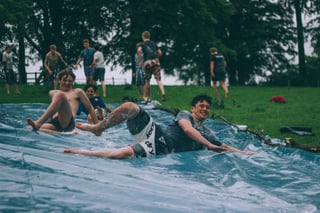Driven by direct demand from Ogden Elementary school parents, MyGuru is proud to announce a summer tutoring program for grades 1-3 in the near north area of Chicago....
Making the Most of Summer
 Summertime; its when students look forward to staying up late, sleeping-in, hanging out with their friends, BBQs and sunny beach getaways. All fun aside, summer is a great time to get a leg up on the competition and to keep your skills sharp. For younger students, summer is the perfect time to brush-up on those subjects that they may struggle with throughout the year. During the summer when you aren’t inundated with multiple classes and extra- curricular activities you can focus on a specific subject where you would like to strengthen your skills.
Summertime; its when students look forward to staying up late, sleeping-in, hanging out with their friends, BBQs and sunny beach getaways. All fun aside, summer is a great time to get a leg up on the competition and to keep your skills sharp. For younger students, summer is the perfect time to brush-up on those subjects that they may struggle with throughout the year. During the summer when you aren’t inundated with multiple classes and extra- curricular activities you can focus on a specific subject where you would like to strengthen your skills.
BRUSH-UP ON YOUR SKILLS
Reading is fundamental, it’s true, as it’s one of the best ways to work on multiple skills simultaneously. Reading helps you to develop a stronger vocabulary, better critical thinking skills, improves focus and concentration and can help you enhance your own writing skills. Reading is not only beneficial to younger learners, but high school, college and graduate school students alike, as the benefits of reading are directly applicable to test taking success! Young readers can read a short list of their chores and older students can strive to finish a novel before the movie adaptation hits theaters. Be sure to throw a book into your beach bag or to read on that weekend road-trip.
Reading and Writing go hand-in-hand, being a strong writer will serve you in any academic or professional pursuit. It is imperative to begin writing, early and often. For most students, writing is usually in the context of a school assignment, we should think outside of the box and incorporate writing into or daily lives. Adolescents can practice their writing by writing a letter home to their parents from sleep-away camp or writing short summaries of a movie. Parents can ask teens to write a persuasive proposal on why they deserve that new expensive gadget or why they should be allowed to attend their first concert with friends. Writing in an everyday context not only helps students develop their writing skills, but it helps them to develop their “voice.” This is an essential skill for writing that “dreaded” college admissions essay. When asked to write an analytical essay, stud
ents should do more than regurgitate the author’s stance, they should know how to use their own words to analyze what the reading states and its greater implications.
Finally, everyone can always brush up on their math skills. Math is one of those things, that, if you don’t use it you lose it. You can incorporate math into your daily life by practicing mental math. When shopping, figure out what your total will be before reaching the register. If that shirt is 40% off, what will the final price be? For younger kids, ask them how long they will have to save their allowance to afford that new toy? Let kids help in the kitchen; cooking is a perfect time to practice math using a measuring cup, cutting pizza or a pie, or do ubling a recipe to feed a crowd.
ubling a recipe to feed a crowd.
TAKE ACTION
Now that you have worked on those reading and writing skills, it is time to put them to good use. High school students should use the summer before their Senior year to write their College Admissions Essay. By this time, you have undoubtedly began thinking about where you would like to attend college and even a potential major. The summer is a good time to get started on this essay because during the Fall of your senior year you have your coursework to keep up with, trying to squeeze in that one last ACT exam, taking trips to visit colleges and of course the first College Application deadlines. You have a good idea of the type of student you are, what interests you and what you are passionate about, so get writing!
This is also a good time to open a first checking and savings account. High school Juniors and Seniors probably have a summer job and opening these accounts is a great way to keep them accountable on their spending and the first step in teaching them financial responsibility, an essential skill before they go off to college.
For students, high school aged and under, help them choose camps and summer activities that will enhance their academic skills. A child who has an interest in math or science would flourish at a robotics or coding camp. A more imaginative child would benefit from a creative writing or drama camp.
PROFESSIONAL DEVELOPMENT
Summer is also the perfect time to take learning beyond academic to experiential. Use summer breaks to, serve an internship in a field you are interested in pursuing. Though you will need to research and apply to internships well before summer (usually the previous fall), you can continue learning beyond the classroom when you are working in the field. Sometimes, there may not be formal internships offered in a field in which you are interested. In these instances, ask if you may shadow a professional in the field. Let’s say you are interested in becoming a dentist, write a letter to your family dentist expressing your interest in the profession and ask if you might spend a day or longer shadowing them at wo rk.
rk.
Time off school is also the perfect time to spend time volunteering for a cause you are passionate about. Philanthropy is accessile to students of all ages. Finally, for graduate and professional students, summer is a practical time to update your CV or Resume. Think back over the previous semesters and list out any courses or professional development you completed, list any classes you taught and conferences you presented at. Always having an updated CV/Resume makes it easier to fire away when a fellowship or job opportunity presents itself.
